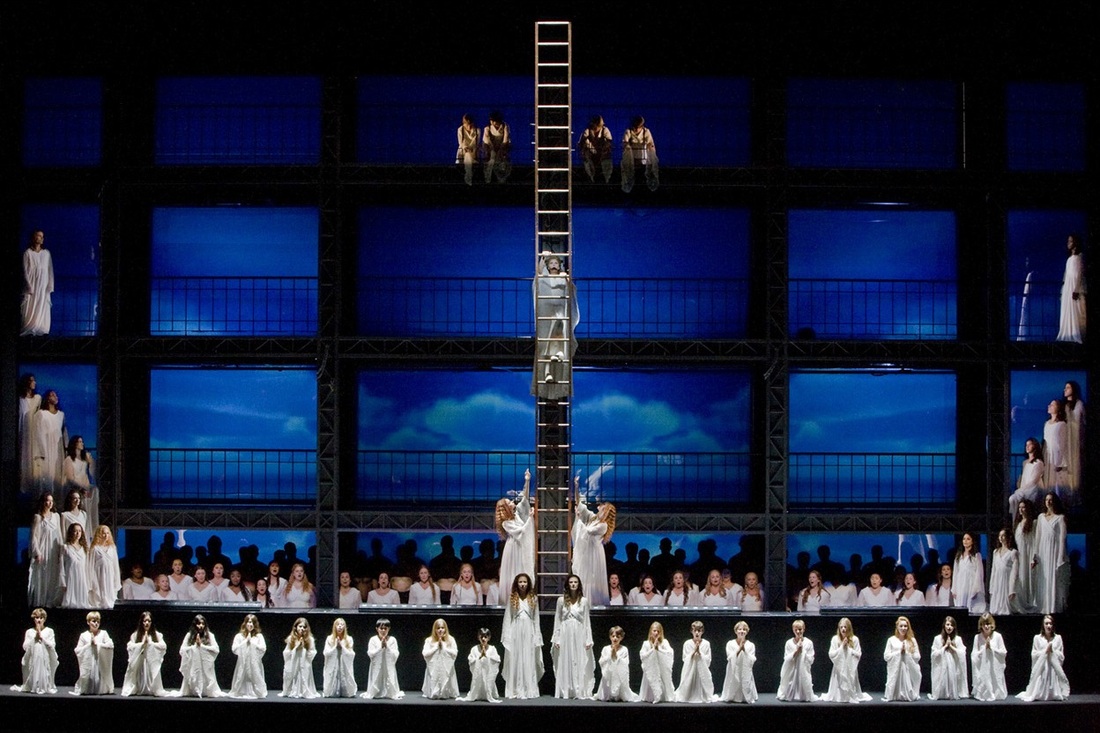From the House of the Dead- I'm in this room alone.

Making its long overdue Met debut, Janacek's final opera From the House of the Dead, based on the Dostoevsky novella, has generated a fairly large amount of anticipation from opera fans of a certain ilk and a lot of positive reviews. Also debuting during this run is Esa-Pekka Salonen, former music director of the LA Phil and possibly the most exciting, bold conductor working today and legendary director Patrice Chereau making his U.S. opera debut. Janacek, Salonen and Chereau- on paper this looked to be the must-see opera of the year. It certainly was the one production I anticipated more than any other. It worked, sometimes incredibly well in a most beautiful way, but I wasn't overwhelmed like I thought I would be. However, I find it still resonates within me days after seeing it.
Chereau's production (previously seen in European houses) is a masterstroke of understanding and explication. Using a huge cast that extends way beyond the singing roles to tell the story and illustrate the bleak, repetitive life of prisoners, he creates a an entirely self-contained universe on the stage. Prisoners are violent, express their all-too-human needs, seek companions and allies, bully each other, release sexual tension and try to maintain a sense of dignity and hope without having any reason to except that it's endemic to the human spirit. All of these expressive themes come through clearly and without ever descending into the expected, banal or trite.
When a torrent of debris and garbage suddenly fall onto the stage it's an indelible moment. Shocking in its force and message, totally disrupting to the mind. While the prisoners cleaned it all up I didn't even notice what they were doing until the floor was cleaned-it seemed the most natural response to a most unnatural occurrence- and in this manner Chereau really captures the spirit of Dostoevsky's work.
The cast is uniformly solid. Willard White (Gorianchikov) has one of the most unique voices and presences in opera today and his character, around which revolves what little of a story there is, is simultaneously pitiable and dignified. Eric Stokossa (Alyeya) takes what is usually a trouser role and invests it with a warmth that makes his interpretation inevitable. Future productions will have difficulty casting a woman in the role after his compelling performance. Kurt Streit (Skuratov), Stefan Margita (Morozov) and especially Peter Mattei (Shiskov) all sing and inhabit what are essentially thankless roles with deep understanding and force. Mattei has the largest role, or essentially the most substantial, and his voice was compelling through a long aria leading to the opera's denouement.
Salonen conducted with precision and clarity- the themes had a resounding urgency and the orchestra never overwhelmed the singers. Janacek's score, full of the darkest of his beloved folk melodies and perhaps his most searing, desparing passages, was in more than capable hands under his baton.
And yet here's the part that leaves me days afterward with a deep ambivalence about the production and unwilling to join in on the accolades being heaped upon it: Janacek's final opera is not as strong as the ones he wrote preceeding it and this production, for all its strengths, doesn't make the case that From the House of the Dead was something that has unjustifiably been missing from the Met stage (and many others) all of these years. Musically and thematically, it's an inversion of The Cunning Little Vixen, but it's not structured nearly as well.
Among the many elements that make Vixen perfect is the story and the music come full circle. From the House of the Dead is episodic and like many other episodic operas (or stories), sometimes they work, sometimes they don't, and the common factor for me in seeing them as a success is being able to establish a common thread within the material for the audience to take away. For me, it doesn't exist here beyond the most obvious expression of how much it sucks to be in a prison. This isn't helped by the fact that the opera has no balance in it as far as characters or stories coming to the fore and showing (not telling) the audience why they matter. White's Gorianchikov comes closest, but his early prominence in the work returns as a mere trickle at the end. All of this isn't to say that it wasn't a pleasure to be finally able to see this work performed, and by such capable hands, but they weren't able to make the opera into more than the flawed sum of its parts. My disappointment in the production stems from relishing all of the creative resources put into it, with all of the extra flourishes Chereau has added to the staging, the potential to overcome the weaknesses of the opera's plot could have been overcome, but from where I sat, they weren't.



